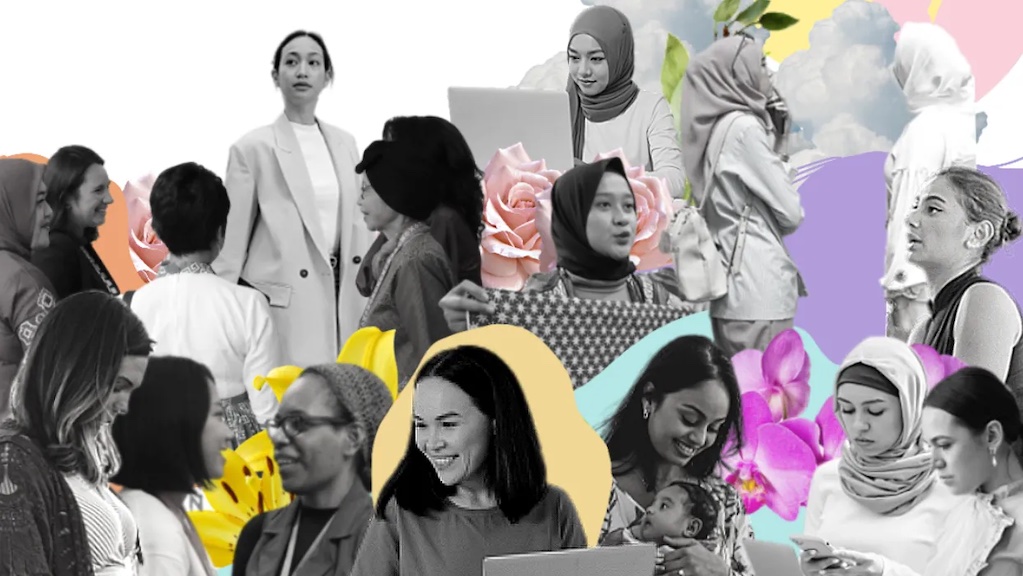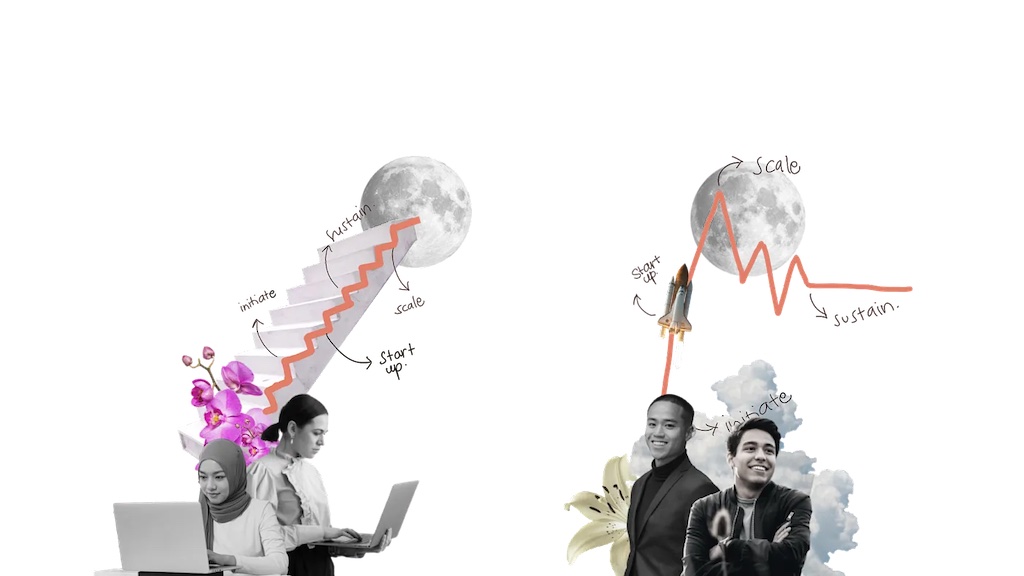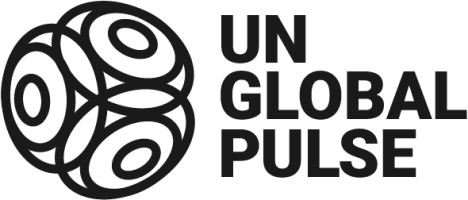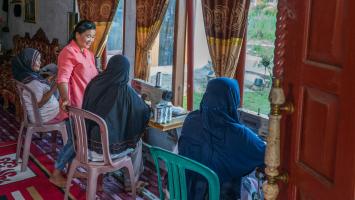Indonesia's Women Impact Entrepreneurs: Her Barriers Are More Systemic Than You Think

Social Systems Researcher, Pulse Lab Jakarta

Design Researcher, Pulse Lab Jakarta

Former Social Systems Lead, Pulse Lab Jakarta
Strategic Communications Manager, Pulse Lab Jakarta

Women entrepreneurs are essential contributors to economic and social transformation, especially in the impact sector, or the businesses that focus beyond generating profit and also contribute to improving social and environmental impact. Illustration credit: Lia Purnamasari/Pulse Lab Jakarta.
Women entrepreneurs face challenges in growing their businesses, including limited access to capital, advice, training opportunities, and support networks.
This story is published in collaboration with Pulse Lab Jakarta.
What comes to mind when you think of constraints faced by women entrepreneurs? Perhaps the barriers you think of relate to access to financial capital, limited support networks, and training opportunities—all of which are exacerbated by societal norms; but what about the interplay between barriers perpetuated daily that hinder the growth of these businesses?
Pulse Lab Jakarta conducted a joint study with UN Women Indonesia to further understand the interrelatedness of these systemic barriers and how they impede the growth of women-led businesses. As we have focused much of our work on strengthening micro, small, and medium-sized enterprises (MSMEs) for inclusive growth over the past 2 years, the joint study, Breaking Growth Barriers for Women Impact Entrepreneurs in Indonesia, offers important insights that shed light on the gender dynamics within the impact sector.
Applying a systemic approach to demystify gender biases affecting women impact entrepreneurs
Women entrepreneurs are essential contributors to economic and social transformation, especially in the impact sector—the businesses that focus beyond generating profit while also contributing to improving social and environmental impact. Yet despite their contribution, women face a range of constraints in growing their businesses. Existing studies conclude that their challenges include limited access to financial capital, advice, and training opportunities, as well as support networks for business-related resources.
A 2021 study demonstrated that, at the global level, women-led startups received only 2.3% of all venture capital funding in 2020, while in Indonesia, Angel Investment Network Indonesia indicated that only 20% of all impact investments went to women-led businesses in the same year. Compounded by societal norms, regulatory constraints, unpaid care work, and gender-based discriminatory policies, it is evident that the barriers women impact entrepreneurs face are more systemic.
Armed with this knowledge, we applied systemic design—a qualitative methodology that combines human-centered design and systems thinking to analyze social systems—alongside other strategies to intervene in the broader system. Utilizing this methodology helped us capture systemic insights and understand the standpoints of individual women entrepreneurs and ecosystem enablers—the actors supporting the growth and economic empowerment of entrepreneurs in Indonesia, ranging from investors, business associations, mentors, and development programs, to government representatives.
To better capture the interplay of systemic factors and growth trajectory, we ensured fair distribution when selecting the maturity of the business (young and mature) and business size. We interviewed 28 women and 14 men impact entrepreneurs holding top executive roles in businesses that integrate digital technologies in their processes. Respondents come from various sectors including care services, agriculture, and health. The interviews were complemented by desk reviews of over 100 reports and academic articles, observations through three women entrepreneurship forums, and additional interviews with seven ecosystem enablers to strengthen the research’s validity.
We worked with the UN Women Indonesia’s program team, as the experts in women impact entrepreneurship, to translate our findings into insights and opportunity areas. UN Women Indonesia’s support helped us test and sharpen our insights and recommendations to present potential high-impact opportunity areas for systemic change, which were further solidified after presenting our findings at the G20 International Conference on Women’s Empowerment.
Key insights
Women impact entrepreneurs are just as growth-oriented and risk-taking as men—the primary difference is in their approach.
Our interviews identified that women and men impact entrepreneurs have a similar vision, ambition, and set of enablers for business growth; however, a difference was found in their underlying rationale, or mental models, when approaching growth and risk. Women impact entrepreneurs believe sustainable growth is achieved through stages and taking calculated risks. They calculate the risks carefully so they have to pass some steps to confirm, which means they take the time to test the viability of their business model before seeking support networks or approaching investors. In contrast, men impact entrepreneurs opt for aggressive growth. They see the impact sector as relatively young and therefore, they believe they need to educate the market while building demand. While impact enterprises have a wide range of growth trajectories, investors are biased toward the aggressive growth model and they perceive women impact entrepreneurs to be too slow in growing their businesses. This becomes a barrier for women impact entrepreneurs to scale up their businesses. Understanding this barrier, how might we diversify financing options that cater to a wider variety of growth and business strategy approaches?

Gender bias impedes women’s ability to leverage the critical enablers needed to grow their business, particularly when they are pregnant or have young children
Our study uncovered how gender biases act as a barrier for women impact entrepreneurs when leveraging the critical enablers needed to grow their business across different levels: individual, social (i.e family, friends, and colleagues), and business community levels (i.e business associations, investing communities, and financial institutions).
At the individual level, both women and men value the importance of leadership skills to grapple with various challenges of a scaled-up business; however, women express more self-doubt about their leadership abilities. Unlike their male counterparts, at the household level, women’s time for self-development is limited by childcare responsibilities, and this holds especially true for women with young children. Among impact entrepreneurs, only women identified family support as a key enabler for business growth.
At the company level, both genders strive to develop their employees’ skills and provide an equitable work environment, but women take it one step further by providing workplace policies that support their female employees who assume childcare responsibilities. At the business community level, women face double the barriers with investors who tend to see pregnancy and motherhood as a risk, and finding the right support network for their stage of growth. Additionally, while some business associations, particularly those dominated by men, can be hostile to women, women-only spaces can also be intimidating due to the dominant "lean-in" narrative that encourages women to assert themselves and grab opportunities to move up in the business world. Indeed, ecosystem enablers are responding through interventions that specifically target women entrepreneurs but there is a need to improve the programming of these interventions to change the gendered power relations. Understanding that women face these challenges across four levels, how might we integrate gender-smart approaches in the support network for women impact entrepreneurs?
Care work entrepreneurs demonstrate significant growth potential, but systemic interventions are needed to scale up the sector
In our study, we were aware of the assumption that women who are C-level executives might not have to deal with unpaid care work as they can afford to hire nannies or domestic helpers. Though that may be the case, they still spend a substantial amount of time and mental energy supervising and providing instructions to their care workers, particularly if their children are still younger than elementary school age. That women C-level executives continue to shoulder the brunt of unpaid care work indicates how systemic this barrier is for women entrepreneurs at large. As we searched for ways to break this barrier, we noticed that efforts have been made within the private sector by care entrepreneurs, and we spoke with those whose businesses covered three types of services: daycare and early learning centers, home care, as well as senior living facilities.
Despite their businesses remaining profitable in the first half of 2022 and their optimism about the future of the industry, they identified a common set of challenges that can stymie their future growth. Some key challenges include a shortage of skilled care workers, as the profession is not viewed as desirable, and high expectation for excellence, which causes the investors to view the care sector as unappealing due to high risk. The entrepreneurs who participated in our study also admitted that their businesses are unaffordable to those who need it most—the lack of comprehensive datasets to estimate the supply and demand for healthcare services in Indonesia has resulted in the care industry serving only the upper middle class. It is clear that redistributing unpaid care work is essential for women’s economic empowerment but unless wider systemic interventions are carried out, care services will continue to under-serve those who need them the most. With this challenge in mind, how might we leverage these signals to strengthen Indonesia’s care economy to meet future needs?
A call to dialogue and action
The following are snippets of three major opportunity areas for further exploration based on the set of systemic barriers examined in the previous sections. They are further elaborated upon in the full report with real-life global examples for inspiration (published in September 2022).
- Diversifying financing options to accommodate a wider range of growth trajectories and business strategy approaches;
- Fostering gender-smart support networks;
- Mobilizing action toward a future-fit care economy.
These opportunity areas are only a few of the many interventions that address the systemic barriers faced by women impact entrepreneurs. Together with UN Women Indonesia, we encourage organizations to use our insights for further discussion and take up action. If you have been working on designing interventions to help women entrepreneurs overcome these barriers, we would love to hear your thoughts.
This article was first published by Pulse Lab Jakarta on Medium on 13 October 2022.
Editorial support: Poppy Ismalina and Pertiwi Triwidiahening (UN Women Indonesia).
Research Team: Maesy Angelina (Social Systems Lead), Lia Purnamasari (Design Researcher), Kiana Puti Aisha (Design Researcher), Rizqi Ashfina (Social Systems Researcher), and Aaron Situmorang (Research Coordinator).

Rizqi Ashfina
Social Systems Researcher, Pulse Lab JakartaRizqi Ashfina works as a social systems researcher at UN Global Pulse through Pulse Lab Jakarta. In her current role, she focuses on unearthing qualitative data to ground truth insights from big data analytics by employing a wide range of qualitative methodologies. Working on the intersection between people, technology, and public policy, her research spreads across different thematic domains, including digital transformation, inclusive digitalization, and women’s economic empowerment.

Lia Purnamasari
Design Researcher, Pulse Lab JakartaLia Purnamasari is the design researcher for United Nations’ Pulse Lab Jakarta. She is experienced in conducting design research within the humanitarian and tech sectors with a breadth of methodologies such as human-centered design, service, and systemic design. In her work with Pulse Lab Jakarta, she focuses on discovering qualitative insights to complement big data analytics for humanitarian purposes including topics such as financial inclusion, safe city for women, and inclusive digitalization for women entrepreneurs.

Maesy Angelina
Former Social Systems Lead, Pulse Lab JakartaMaesy Angelina is the former team lead of social researchers at Pulse Lab Jakarta. She led the team in harnessing qualitative insights through collaborative design, systems thinking, strategic foresights and behavioral insights to solve problems on issues ranging from safe transport for women, financial inclusion for micro enterprises, bridging digital inequalities, to the adoption of data and tech solutions for better policy making.
Andini Kamayana
Strategic Communications Manager, Pulse Lab JakartaAndini Kamayana is the communications manager at Pulse Lab Jakarta. Her experience in digital communication and knowledge management stems from her work in the development sector with various organizations including multilaterals, private companies, and international NGOs.

UN Global Pulse Asia Pacific Hub
UN Global Pulse is the United Nations Secretary-General’s innovation lab. The Asia Pacific Hub is designed to run portfolios of on-the-ground innovation projects that apply data, digital, foresight and behavioral science methods to regional issues. The hub builds on the successful partnership model that spans over 10 years between the UN and the Government of Indonesia under the Pulse Lab Jakarta portfolio.
Visit our Knowledge Hub at http://knowledgehub.pulselabjakarta.org/.


